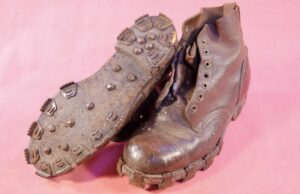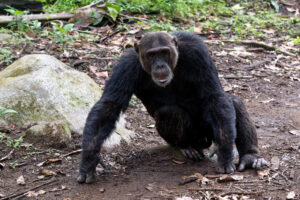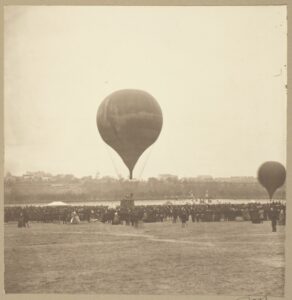Thomas Manning was a remarkable scholar and master linguist, but his eccentricities and single-minded drive to reach Peking gave him a reputation as a bumbler.
Although Manning didn’t graduate from Cambridge (the idea of passing tests was preposterous to him), he had excelled. He was probably England’s first Sino-maniac. He had tired of studying Latin, Greek, mathematics, and philosophy. Instead, he set his mind to the ultimate linguistic challenge: Chinese literature.
Starting at the Centre of Oriental Studies in Paris, Manning soon became obsessed with reaching the language’s source. He planned to travel to Peking (now Beijing). There was just one problem: Foreigners were forbidden from entering China. They weren’t even allowed to study the language.
So Manning concocted a scheme. First, he enlisted a Chinese tutor from Macau, hoping to avoid unwanted attention. The pair set off from Canton (modern-day Guangzhou), on an East India Company Ship.
Tried to pass himself off as Vietnamese
For every ounce of academic intelligence, Manning seemed to lack common sense. His first hare-brained scheme to enter mainland China involved passing as Vietnamese. He disembarked off the coast of Northern Vietnam in a long traditional gown. Unfortunately, it didn’t matter how authentic the gown was. Tall and pale, Manning had no hope of fooling anyone. They were forced to find another route.
Manning looked to Tibet for an alternative. However, he did very little research into the 5,000km journey. Since the 1788 war between Tibet and Nepal, Tibet was only open to Tibetan nationals, Chinese diplomats, and Chinese troops. Eccentric Englishmen had not made the shortlist. Chinese troops were stationed in Lhasa and other large Tibetan towns.
Many explorers longed to visit Tibet. Some had come close, but no one had made it as far as Lhasa. Manning was not fond of traveling, was ill-prepared for the journey, and had no financial backing. Yet he was attempting a world first.
His knowledge was so limited that he brought a pair of ice skates to take advantage of the Himalayan winter. Adding to the farce, Manning and his tutor continuously argued.
In 1811, the pair departed from Calcutta, India, by horseback. Though Manning was a hopeless rider, they persevered through the Himalaya to Tassisudon (now Thimphu, the capital of Bhutan).
Altitude wreaked havoc on Manning’s temperament. Uncharacteristically calm, he noted blandly in his journal that he felt a “strange sensation coming along: warm and comfortable.”
Fixated on filth
The small village of Phari was Manning’s first introduction to Tibetan customs. It should have been an honor, but he found it displeasing. Instead of remarking on the surroundings, language, or customs, he fixated on the filth.
The village was strewn with waste. Rubbish was piled so high that people had dug holes to reach their doors. The eye-watering stench attracted vultures. In the distance were views of Tibet’s snow-capped mountains. But Manning didn’t even notice.
When they had arrived, a Tibetan official greeted them. Bizarrely, Manning assumed the character of a pilgrim from Bengal. Aside from the obvious appearance discrepancies, the tall, pale-skinned, bearded man with an English accent was accompanied by a Chinese tutor.
Thoroughly perplexed, the official didn’t know what to make of the duo. He left the matter for a high-ranking military officer who was due in town shortly. However, the officer needed a place to stay, so Manning and his tutor were downgraded to a place of “dirt, dirt, grease, smoke, misery, but good mutton,” as he recounted in his journal.

To the frustration of many, Manning’s journal provided nothing of geographical substance. Photo: The Guardian
Thankfully, two of Manning’s skills played to his advantage. He was by now fluent in Chinese and knowledgeable about medicine, which the Chinese troops desperately needed.
Dr. Manning, I presume?
Manning had studied medicine hoping it would pay off in the Orient. Now he was positioned to set up an impromptu clinic for Chinese troops. Manning’s luck was on the rise.
The Chinese officer invited him to proceed with them as far as Gyantse. Naturally, Manning decided to assume another comical disguise. This time he cloaked himself as a Chinese physician, with spectacles and a long gown.
The trek was no holiday. Manning suffered from bedbugs and repeatedly fell from his horse. Undeterred, they arrived in Gyantse. Manning was the first Englishman to make it that far into Tibet in 28 years.
George Bogle and Samuel Turner had been the last Englishmen in Tibet. Both men were sent to improve trade relations but had come up short. Manning should have been an ideal candidate to continue their task, but he was overlooked for the role. His wacky character was considered unsuitable for negotiating deals. Regardless, it was hoped that he would return to Britain with valuable data. Instead, he traveled on his own agenda.
Impressed with Manning’s medicinal skills, the officer eventually granted Manning permission to enter Lhasa, accompanied by Tibetan monks. Manning even managed to acquire a cook in the arrangement.
Finally enters Lhasa
Manning became the first Englishman to enter the city, a momentous occasion. Unfortunately, he could barely string together a sentence to describe his experience. “Our first care was to provide ourselves with proper hats,” were his first written words. Unaware that Tibetan headdress denotes rank, he trundled off to a hat maker.
Other descriptions from the explorer included calling prayer wheels “whirligigs”. And when he encountered the Tsangpo (a river that had preoccupied geographers for a century), he was more focused on seating arrangements than geography: “I could not sit still, but must climb about, seat myself in various postures on the parapet, and lean over,” he penned in his journal.
The Holy City was just another unimpressive sight for Manning. The city had no plumbing, garbage was piled up, and mangy dogs roamed the streets. The garbage was only collected annually. “If the palace exceeded my expectations, the town far fell short of them. There is nothing striking, nothing pleasing in its appearance,” he wrote.
Manning bumbled his way through an official greeting with the Chinese Emperor’s representative in Lhasa. To look the part, he donned as much local clothing as he could garner, hoping it would help him enter China.
The Dalai Lama
He even met the Dalai Lama. The Dalai Lama asked Manning if he’d met with any “molestations and difficulties on the road.” Manning answered without hesitation, “Many.”
Despite Manning’s attitude, the locals were besotted with him. He became the talk of the town and many Tibetans traveled long distances to see this peculiar and exotic personage in the flesh.
With the meager earnings from his medical practice, Manning stayed in Lhasa for several months. But when he began to suffer from rheumatism, he rushed to leave. He sold off his gear cheaply, which aroused the suspicion of local officials. They suspected that he was a spy, or worse, a missionary.
Frightened that he’d be discovered as someone wanting to learn the Chinese language, Manning saddled up and bolted back to Calcutta and then on to Canton by boat. His tutor remained in Lhasa.
Lhasa had finally been visited by an Englishman but Manning had never wanted to be there. He simply wanted to visit Peking. In 1817, he had his opportunity.
By joining a British Embassy delegation as an interpreter, he could enter Peking. To appear more diplomatic, he ditched his gown but elected to keep his beard. It had taken six years but Manning had reached his holy grail.
Perhaps predictably, his visit was fleeting. Almost immediately, an argument about protocol broke out. Soon after, his team was put on a ship to England without the chance to explore.
Bitter about the experience and tight-lipped on detail, Manning settled back in England. He had no furniture but possessed the best Chinese library in Britain. Until 1903, Manning remained the only Englishman ever to enter Tibet.
Related Posts









